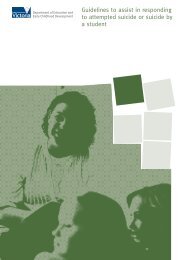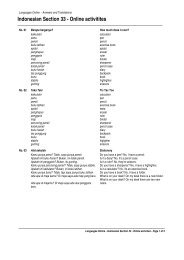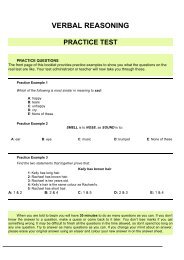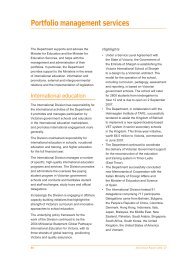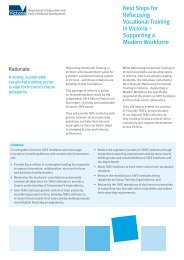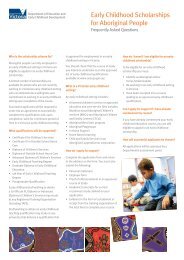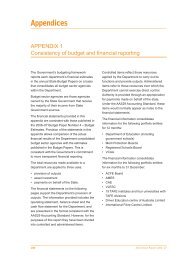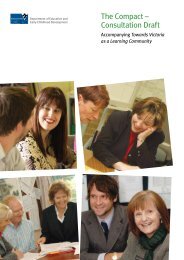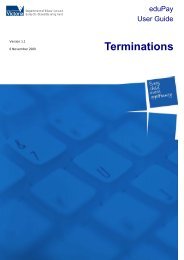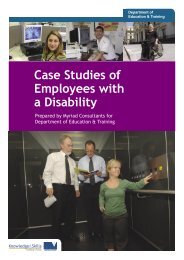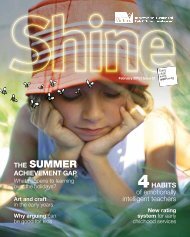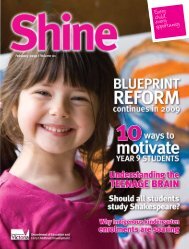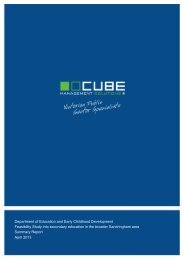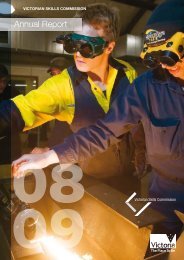November 2009 Vol. 1, Issue 10 (PDF - 16.2Mb) - Department of ...
November 2009 Vol. 1, Issue 10 (PDF - 16.2Mb) - Department of ...
November 2009 Vol. 1, Issue 10 (PDF - 16.2Mb) - Department of ...
Create successful ePaper yourself
Turn your PDF publications into a flip-book with our unique Google optimized e-Paper software.
56 Nov 09 Research Xxxx<br />
RECENT STUDY<br />
Measuring activity levels in children<br />
at a specialist school<br />
Glenallen School is purpose-built to meet the<br />
educational and mobility needs <strong>of</strong> students<br />
who have a physical disability or significant<br />
health impairment. In 2008, the school<br />
received a grant from the <strong>Department</strong> to<br />
conduct a practitioner-led research project. The<br />
school chose the key theme <strong>of</strong> student support,<br />
and formed their project around the research<br />
question: How much time do school-aged<br />
children with cerebral palsy engage in upright<br />
activities at school and at home, and what are<br />
the key predictors?<br />
Research shows that physical activity is vital<br />
for children’s social, physical and emotional<br />
development. Weight-bearing is important for<br />
hip joint development, preventing contractures,<br />
maintaining bone density and encouraging<br />
digestion and circulation. Furthermore,<br />
physical activity improves muscle strength<br />
and flexibility, improves cardiovascular fitness<br />
and assists with healthy weight maintenance.<br />
Lastly, the social aspect <strong>of</strong> play cannot be<br />
underestimated, and exercise in general has<br />
great psychological benefits.<br />
Approximately half the students at Glenallen<br />
have cerebral palsy. Due to the nature and<br />
severity <strong>of</strong> their disability, these students<br />
<strong>of</strong>ten spend large amounts <strong>of</strong> time seated in<br />
a wheelchair, with minimal position changes.<br />
The research project investigated the number<br />
<strong>of</strong> hours per day in which children 5–18<br />
years-old with cerebral palsy engage in upright<br />
activity, with the purpose <strong>of</strong> monitoring<br />
and developing school initiatives towards<br />
increasing upright and weight-bearing activity,<br />
and promoting a more active lifestyle.<br />
The study found that the average time students<br />
spent in upright activities was 1.5 hours per<br />
day in contrast with an average <strong>of</strong> 5.4 hours for<br />
typically-developing children.<br />
Children’s level within the Gross Motor<br />
Function Classification System (GMFCS)<br />
was a strong predictor <strong>of</strong> the amount <strong>of</strong> time<br />
spent in upright, weight-bearing activities.<br />
The amount <strong>of</strong> time spent in upright activities<br />
decreased as the GMFCS level increased.<br />
Hence, while students at level two (who walk<br />
without an assistive device in most settings)<br />
spent an average <strong>of</strong> 3.25 hours being active,<br />
students who were classified as level five (who<br />
have difficulty with head and trunk control and<br />
are transported in a manual wheelchair in all<br />
settings), spent only 0.5 hours being upright.<br />
In addition, there was a significant difference<br />
in the time spent upright at home versus at<br />
school, with children at all GMFCS levels<br />
spending more time at school involved in<br />
upright activities. Similar factors affecting<br />
the amount <strong>of</strong> upright time for students with<br />
higher GMFCS were found in both school<br />
and home settings including lack <strong>of</strong> awareness<br />
<strong>of</strong> the importance <strong>of</strong> standing, lack <strong>of</strong> funding<br />
for equipment and/or space and lack <strong>of</strong> time.<br />
Mathematics Specialist Teacher<br />
Victorian Office – 20<strong>10</strong><br />
The Australian Bureau <strong>of</strong> Statistics<br />
is seeking a Mathematics teacher<br />
for 20<strong>10</strong>. The successful applicant<br />
will be required to develop<br />
resources aimed at increasing the<br />
statistical literacy and capability <strong>of</strong><br />
teachers and students.<br />
For further information, go to www.abs.gov.au/careers<br />
or contact Christine Sergi on 9615 7695 or 0419 876 921<br />
• The Planetarium and Dome<br />
Theatre that comes to your<br />
school<br />
• Incursions save schools money,<br />
and avoid disruption and fuss<br />
• Cost from $ 4.50 per head.<br />
Journeyman Education Services<br />
The Portable Planetarium<br />
plus Movies all over the Total Dome<br />
• A choice <strong>of</strong> movie topics –<br />
Astronomy, Earth Science,<br />
Biology, etc<br />
• Every session includes<br />
our Astronomy “Sky Explorer”<br />
programme.<br />
BOOKINGS<br />
STILL OPEN<br />
FOR TERM 4<br />
Phone: 9748 8326 Fax: 9749 5931<br />
Email: cosmodome@cosmodome.net



